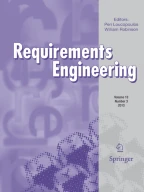The fidelity and practicality of using soft systems methodology (SSM) to empower the workforce such that its members can make a fuller contribution to the requirements engineering process is critically analysed. The detailed analysis is carried out by using a (critical) philosophical approach to develop an interpretation of (some key aspects of) requirements engineering practice in actual information systems development situations, utilising a number of practical requirements engineering studies. This analysis is built upon to explain the relationship between requirements engineering, SSM and workforce empowerment. It is concluded that, by maintaining critically focused attention on the economic context, it is theoretically possible to engineer requirements for information systems that would actually empower the workforce. However, the likelihood of using SSM successfully for this purpose is low, as the economic context in which requirements engineering takes place is largely ignored by the SSM advocates.
Similar content being viewed by others
Author information
Authors and Affiliations
Rights and permissions
About this article
Cite this article
Probert, S. Requirements Engineering, Soft Systems Methodology and Workforce Empowerment. Requirements Eng 4, 85–91 (1999). https://doi.org/10.1007/s007660050015
Issue Date:
DOI: https://doi.org/10.1007/s007660050015
